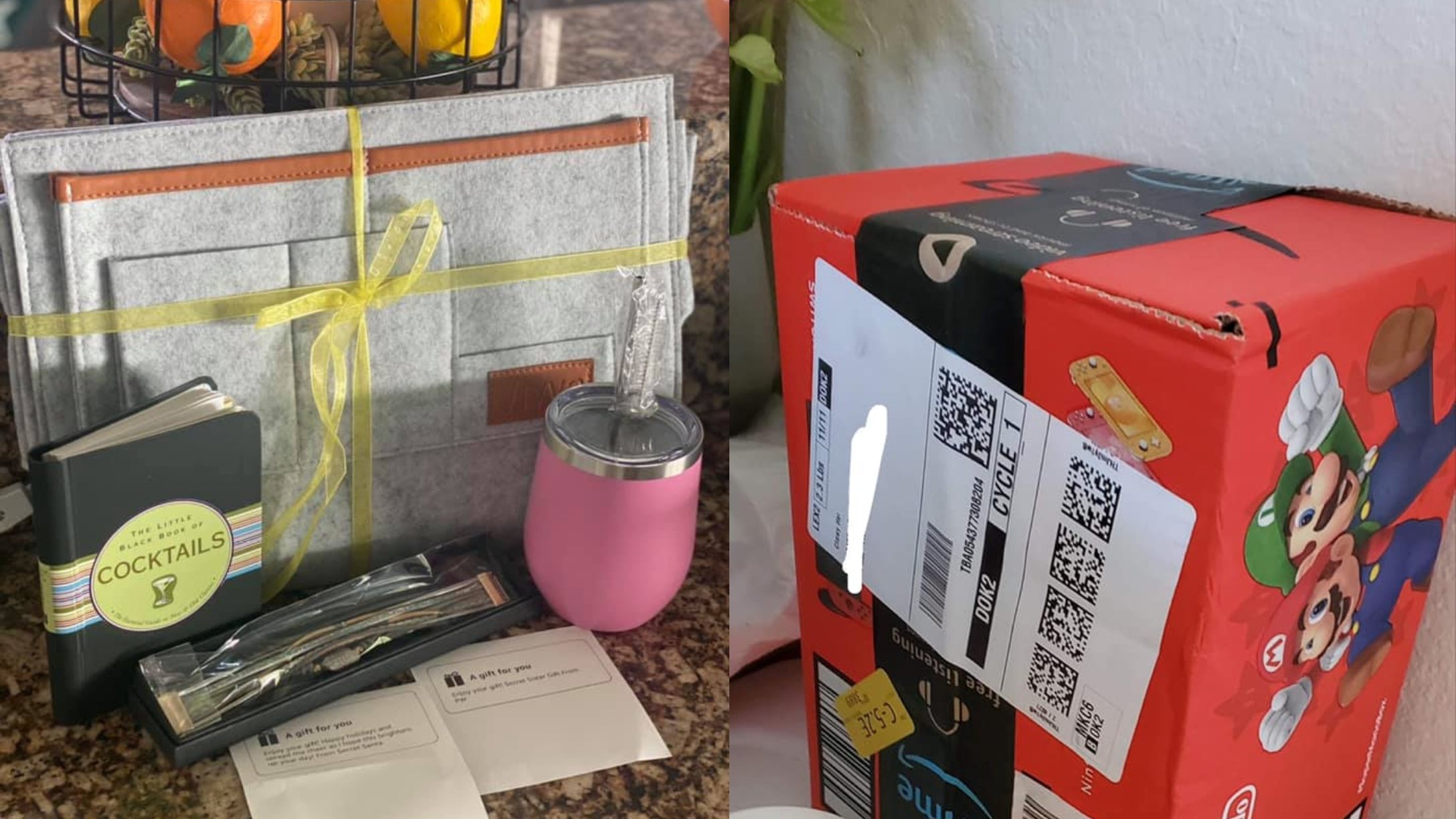
Chances are, you've seen the tweets. Or maybe you learned about it through your Facebook moms' group. Either way, a new gifting craze appears to be sweeping Facebook and Twitter in the last few weeks, and people aren't quite sure what to make of it. It's called the "Secret Sister Gift Exchange," and while it sounds innocent enough, critics say it's anything but well-intentioned. In fact, the Secret Santa-style present swap is being described as a pyramid scheme that's gipping women across the country — and the Better Business Bureau has even called it illegal.
The posts promoting the exchange sound full of holiday cheer
"'Tis the season!" the captions declare, along with a string of holiday-themed emojis. "Spread kindness!" they urge.
Many are posted in private Facebook groups mostly comprised of women, where they encourage people to send a small gift to a stranger, as a pay-it-forward kind of gesture.
The gifts can be of your choosing, and are supposed to be low in cost, with many posts capping them at $10 or less. (Think: Inexpensive bottles of wine, a cute coffee mug, or a day planner.)
At first read, it seems like a pretty small investment to make someone else's day, particularly during a year that's been nonstop depressing.
But get this — there's also something in it for you.
For every gift you send, you're supposed to get more in return
In fact, the invitation claims that anywhere from six to 36 gifts sent by strangers will be delivered right to your door.
… Suspicious? If not, you should be.
The gift exchange is not actually new
It's been floating around social media since 2015, but seems to have really picked up steam this year, thanks to the fact that most Americans are stuck at home due to the pandemic and are desperately trying to drum up some holiday cheer.
But recently, the Better Business Bureau took a closer look at the practice, and found that the whole thing really is a bit of a scam. In fact, the BBB even went so far as to label it an illegal pyramid scheme, and posted a warning on its website early this month.
Here's how it really works
First, you get invited by a friend or acquaintance through email or social media. If you decide to opt in, you're asked to provide your full name and address, so you can receive your gift in the mail.
But in order to qualify, you also have to add the names of a few additional friends to a list (which by now is growing quite large, as the gift exchange takes over social media).
To keep the chain going, you then have to send an invite of your own — either through email or social media — requesting that others join in, too.
In the weeks that follow, you might anxiously await the arrival of your mystery gifts. You may check the mailbox or your front porch hourly.
Here's the thing, though: They're probably not going to arrive. As in, ever.
At least, that's what the BBB is currently reporting
"The cycle continues and you're left with buying and shipping gifts for unknown individuals, in hopes that the favor is reciprocated by receiving the promised number of gifts in return," reads a PSA on the agency's website. "Unfortunately, it doesn't happen. Just like any other pyramid scheme, it relies on the recruitment of individuals to keep the scam afloat. Once people stop participating in the gift exchange, the gift supply stops as well, and leaves hundreds of disappointed people without their promised gifts."
There are people who swear by it, though
But according to the USPS, it doesn't really matter
Either way, these types of pyramid schemes, when conducted through the mail, are considered a form of gambling. In fact, the USPS website clearly states that participants are subject to penalties including jail time, fines, or even a lawsuit for mail fraud.
Yikes.
There's one more downside to all of this, too: Signing up with your personal information (including your mailing address) opens you up to being the victim of of crimes.
"With just a few pieces of information, cyber thieves could expose you to future scams or commit identity theft," the BBB warns.
So what can you do?
According to the BBB, you have a few options.
For starters, you should just say no, and consider yourself better safe than sorry.
But you could also go one step further, and report the posts when you see them. (To do so, simply click on the upper righthand corner of the Facebook post and select "Report post" or "report photo.")
But moving forward, the BBB suggests you also think twice about viral trends like this in the future. If ever you're asked to provide your personal information to strangers, remember you could be putting yourself at risk of identity theft.
And lastly, be wary of false claims, the BBB warns.
"Some pyramid schemes try to win your confidence by claiming they're legal and endorsed by the government," the website states. "These imposter schemes are false as the government will never endorse illegal activity. No matter what they claim, pyramid schemes will not make you rich. You will receive little to no money back on your 'investment' or gift exchange."
In the meantime, stick to some good 'ole fashioned holiday fun that you know will keep you out of trouble, and opt for Secret Santa gift exchanges with people you know. Even if you're stuck getting an oversized coffee mug for the sixth year running, it's better than getting your identity stolen (or worse — going to jail).




